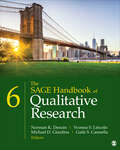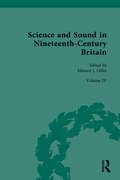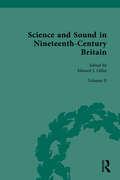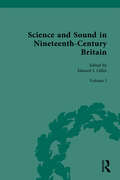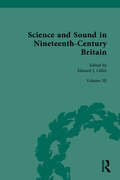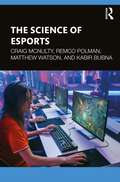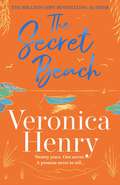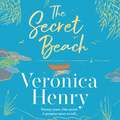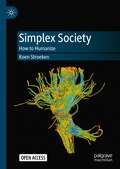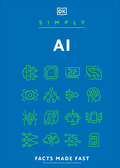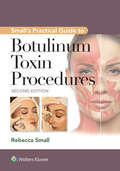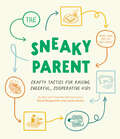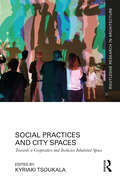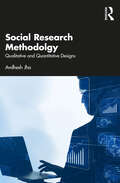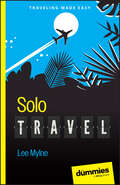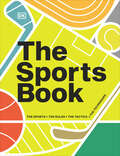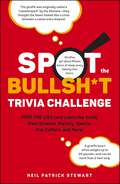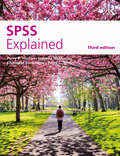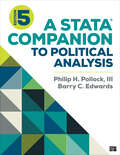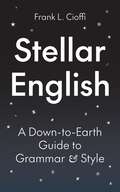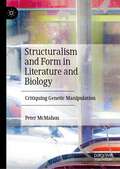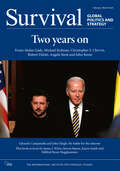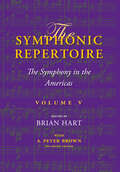- Table View
- List View
The SAGE Handbook of Qualitative Research
by Norman K. Denzin Yvonna S. LincolnThis new edition of the SAGE Handbook of Qualitative Research represents the sixth generation of the ongoing conversation about the discipline, practice, and conduct of qualitative inquiry. As with earlier editions, the Sixth Edition is virtually a new volume, with 27 of the 34 chapters representing new topics or approaches not seen in the previous edition, including intersectionality; critical disability research; postcolonial and decolonized knowledge; diffraction and intra-action; social media methodologies; thematic analysis, collaborative inquiry from the borderlands; qualitative inquiry and public health science; co-production and the politics of impact; publishing qualitative research; and academic survival. Authors in the Sixth Edition engage with questions of ontology and epistemology, the politics of the research act, the changing landscape of higher education, and the role qualitative researchers play in contributing to a more just, egalitarian society. To mark the Handbook’s 30-year history, we are pleased to offer a bonus PART VI in the eBook versions of the Sixth Edition: this additional section brings together and reprints ten of the most famous or game-changing contributions from the previous five editions.
The SAGE Handbook of Qualitative Research
by Norman K. Denzin Yvonna S. LincolnThis new edition of the SAGE Handbook of Qualitative Research represents the sixth generation of the ongoing conversation about the discipline, practice, and conduct of qualitative inquiry. As with earlier editions, the Sixth Edition is virtually a new volume, with 27 of the 34 chapters representing new topics or approaches not seen in the previous edition, including intersectionality; critical disability research; postcolonial and decolonized knowledge; diffraction and intra-action; social media methodologies; thematic analysis, collaborative inquiry from the borderlands; qualitative inquiry and public health science; co-production and the politics of impact; publishing qualitative research; and academic survival. Authors in the Sixth Edition engage with questions of ontology and epistemology, the politics of the research act, the changing landscape of higher education, and the role qualitative researchers play in contributing to a more just, egalitarian society. To mark the Handbook’s 30-year history, we are pleased to offer a bonus PART VI in the eBook versions of the Sixth Edition: this additional section brings together and reprints ten of the most famous or game-changing contributions from the previous five editions.
Science and Sound in Nineteenth-Century Britain: Sound Transformer (Nineteenth-Century Science, Technology and Medicine: Sources and Documents #4)
by Edward J. GillinSound and Science in Nineteenth-Century Britain is a four-volume set of primary sources which seeks to define our historical understanding of the relationship between British scientific knowledge and sound between 1815 and 1900. In the context of rapid urbanization and industrialization, as well as a growing overseas empire, Britain was home to a rich scientific culture in which the ear was as valuable an organ as the eye for examining nature. Experiments on how sound behaved informed new understandings of how a diverse array of natural phenomena operated, notably those of heat, light, and electro-magnetism. In nineteenth-century Britain, sound was not just a phenomenon to be studied, but central to the practice of science itself and broader understandings over nature and the universe. This collection, accompanied by extensive editorial commentary, will be of great interest to students and scholars of the History of Science.
Science and Sound in Nineteenth-Century Britain: Philosophies and Epistemologies of Sound (Nineteenth-Century Science, Technology and Medicine: Sources and Documents #2)
by Edward J. GillinScience and Sound in Nineteenth-Century Britain is a four-volume set of primary sources which seeks to define our historical understanding of the relationship between British scientific knowledge and sound between 1815 and 1900. In the context of rapid urbanization and industrialization, as well as a growing overseas empire, Britain was home to a rich scientific culture in which the ear was as valuable an organ as the eye for examining nature. Experiments on how sound behaved informed new understandings of how a diverse array of natural phenomena operated, notably those of heat, light, and electro-magnetism. In nineteenth-century Britain, sound was not just a phenomenon to be studied, but central to the practice of science itself and broader understandings over nature and the universe. This collection, accompanied by extensive editorial commentary, will be of great interest to students and scholars of the History of Science.
Science and Sound in Nineteenth-Century Britain: Sounds Experimental and Entertaining (Nineteenth-Century Science, Technology and Medicine: Sources and Documents #1)
by Edward J. GillinSound and Science in Nineteenth-Century Britain is a four-volume set of primary sources which seeks to define our historical understanding of the relationship between British scientific knowledge and sound between 1815 and 1900. In the context of rapid urbanization and industrialization, as well as a growing overseas empire, Britain was home to a rich scientific culture in which the ear was as valuable an organ as the eye for examining nature. Experiments on how sound behaved informed new understandings of how a diverse array of natural phenomena operated, notably those of heat, light, and electro-magnetism. In nineteenth-century Britain, sound was not just a phenomenon to be studied, but central to the practice of science itself and broader understandings over nature and the universe. This collection, accompanied by extensive editorial commentary, will be of great interest to students and scholars of the History of Science.
Science and Sound in Nineteenth-Century Britain: Sound in Context (Nineteenth-Century Science, Technology and Medicine: Sources and Documents #3)
by Edward J. GillinScience and Sound in Nineteenth-Century Britain is a four-volume set of primary sources which seeks to define our historical understanding of the relationship between British scientific knowledge and sound between 1815 and 1900. In the context of rapid urbanization and industrialization, as well as a growing overseas empire, Britain was home to a rich scientific culture in which the ear was as valuable an organ as the eye for examining nature. Experiments on how sound behaved informed new understandings of how a diverse array of natural phenomena operated, notably those of heat, light, and electro-magnetism. In nineteenth-century Britain, sound was not just a phenomenon to be studied, but central to the practice of science itself and broader understandings over nature and the universe. This collection, accompanied by extensive editorial commentary, will be of great interest to students and scholars of the History of Science.
The Science of Esports
by Craig McNulty Remco Polman Matthew Watson Kabir BubnaThe Science of Esports draws from contemporary research and coach expertise to examine esports athlete health and performance from a range of disciplinary perspectives, including physiology, psychology, sociology, and nutrition. The rapid expansion of the esports industry has elevated competitive video gaming into the realm of high performance, requiring players, coaches, and practitioners to implement interdisciplinary approaches to performance support. The book covers key topic areas such as: What esports is and similarities and differences to sport Game-specific training Physiological and psychological consideration for esports athletes Social aspects of player performance and the social environment of esports Esports coaching and structure of esports performance environments Technology and its use in esports Safeguarding, cheating, and gambling This book includes worked examples and case studies to allow immediate implementation into practice for esports athletes and coaches. It summarises the current state of research to inform researchers and identify gaps in knowledge. This book is critical reading for students of esports and related courses. It serves as the first scientific resource designed to provide athletes, coaches, and practitioners with interdisciplinary insights into esports health and performance.
The Secret Beach: The stunning, escapist and gorgeously romantic new novel from the Sunday Times bestselling author
by Veronica HenryTHE STUNNING AND ROMANTIC NEW NOVEL FROM SUNDAY TIMES BESTSELLING AUTHOR VERONICA HENRY!'Dreamy and irresistible!' JILL MANSELL'A summery tale of intrigue, family drama and romance. I loved it!' SARAH MORGANTwenty years.One secret.A promise never to tell...Nikki finally owns the little coastguard cottage of her dreams - and it's a few steps away from the hidden beach that means so much to her.But when a handwritten note lands on her doorstep, she realises it's only a matter of time before the heartbreaking truth of her past is uncovered.Twenty years ago, her whole world was turned upside-down when a terrible storm rolled into the small seaside town of Speedwell.Ever since that night, Nikki has been keeping a secret. One she knows has the potential to destroy the lives of those she loves most.Because as sure as the tide turns, there are no secrets in a small town...Your favourite authors love The Secret Beach:'What an amazing book! Veronica always delivers a cracking read, but this is exceptional' MILLY JOHNSON'Family secrets, a beautiful Cornish setting and a beach like no other... I was swept away!' LUCY DIAMOND'Captivating and romantic. I completely fell in love with Speedwell' HEIDI SWAIN'A wonderful treat of a read!' SUE MOORCROFT'A story filled with so much heart. Simply gorgeous!' LIZ FENWICK'Warm, wise, and completely wonderful. I now want to move to Speedwell immediately' ALEX BROWN
The Secret Beach: The stunning, escapist and gorgeously romantic new novel from the Sunday Times bestselling author
by Veronica HenryTHE STUNNING AND ROMANTIC NEW NOVEL FROM SUNDAY TIMES BESTSELLING AUTHOR VERONICA HENRY!'Dreamy and irresistible!' JILL MANSELL'A summery tale of intrigue, family drama and romance. I loved it!' SARAH MORGANTwenty years.One secret.A promise never to tell...Nikki finally owns the little coastguard cottage of her dreams - and it's a few steps away from the hidden beach that means so much to her.But when a handwritten note lands on her doorstep, she realises it's only a matter of time before the heartbreaking truth of her past is uncovered.Twenty years ago, her whole world was turned upside-down when a terrible storm rolled into the small seaside town of Speedwell.Ever since that night, Nikki has been keeping a secret. One she knows has the potential to destroy the lives of those she loves most.Because as sure as the tide turns, there are no secrets in a small town...Your favourite authors love The Secret Beach:'What an amazing book! Veronica always delivers a cracking read, but this is exceptional' MILLY JOHNSON'Family secrets, a beautiful Cornish setting and a beach like no other... I was swept away!' LUCY DIAMOND'Captivating and romantic. I completely fell in love with Speedwell' HEIDI SWAIN'A wonderful treat of a read!' SUE MOORCROFT'A story filled with so much heart. Simply gorgeous!' LIZ FENWICK'Warm, wise, and completely wonderful. I now want to move to Speedwell immediately' ALEX BROWN
Simplex Society: How to Humanize
by Koen StroekenThis open access book provides thought-provoking anthropology grounded in comparative ethnography. The theory captures the current historical moment, the long-term trends that led us here, and the prospects for a humane future. The experience of complexity characterizing a globalized information society triggers simplexes. These unidimensional responses instrumental in bringing about a predictable effect are altering our ways of communicating and the technologies we design. In Part I, a ‘speciated’ history, injected with the anthropology of Bateson and Gluckman, describes the semantic and experiential impoverishment of the lifeworld. After going through the affects of distrust (the neolithic lifeway), of futility (industrial lifeway) and disconnection (post-knowledge), the human species today depends for its survival on installing a new lifeway, which manages to wed (eco-social) inclusion to the already difficult first pair of the French Revolution. The species needs to rehumanize. Part II illustrates the remedies currently developed: to reframe, re-sphere and re-source. What do critical street art, international football matches, presidential elections, hip-hop dissing performances, charismatic church services, intuition stimulation, and ‘pre-ceptive’ experiences of consciousness have in common? They are moments of the real. Rooted in ‘life sensing’, they are tensors organizing frameshift. As multiplex measures tackling the simplex, these tensors overcome the cultural relativism of the postmodern matrix.
Simply AI (DK Simply)
by DKUnderstanding AI has never been easier.Combining bold graphics with easy-to-understand text, Simply Artificial Intelligence is the perfect introduction to the world of AI for those who are short of time but hungry for knowledge.Covering a broad range of fields within AI – from computing and mathematics to politics and philosophy – entries demystify what artificial intelligence is and how it works, how it has dramatically changed the way we live, and how it might evolve in the future.Explaining each individual aspect of AI more clearly than ever before, the book outlines the key building-blocks and technological milestones in its history, profiles its most important practical applications – both currentand predicted – and explores the numerous ethical debates around AI, and its increasing influence on culture and society.Whether you are studying science or AI-related subjects at school or college, or simply want a jargon-free overview of this increasingly important subject, this essential guide is packed with everything you need to understand the basics quickly and easily.
Small's Practical Guide to Botulinum Toxin Procedures
by Rebecca SmallSmall’s Practical Guide to Botulinum Toxin Procedures, Second Edition, is the highly anticipated revision of the best-selling step-by-step guide to performing minimally invasive botulinum toxin procedures. With over four hundred 5-star reviews online, the First Edition established itself as the go-to resource for providers looking to enhance their practice by performing medical aesthetic procedures. In the Second Edition, insights from Dr. Small’s additional 10 years of clinical practice, research, and teaching create an even more valuable resource, whether you are new to aesthetic medicine or an experienced practitioner. Small’s Practical Guide provides you with the latest information and techniques, best practices for risk reduction, and expert guidance for optimal results.
The Sneaky Parent: Crafty Tactics for Raising Cheerful, Cooperative Kids
by David Borgenicht James GraceMore than 200 clever tips to help stubborn kids go to bed, clean their room, take a bath, and more—without tears or fights.As a parent, you want nothing more than to keep your child fed, clothed, clean, healthy, and safe. Your kid, meanwhile, wants nothing more than to eat junk, go nude, stay up all night, and fall down a well. Begging doesn&’t work. Bribery isn&’t sustainable. You don&’t want to shout. It&’s time to get sneaky.The Sneaky Parent offers a full playbook of clever ploys for beating kids at their own game. With the strategies outlined in this book, you can gently guide kids toward positive choices—while letting them think they&’re the ones in control. Learn how to: Boost oral hygiene by pretending a toothbrush is a paintbrush for teethRender long plane trips painless with a game of &“Name That Cloud&”Calm separation anxiety by developing fun ways to wave goodbyeAnd dozens of other clever tactics, tricks, and gamesWith a little benevolent sneakiness, your child will enthusiastically try new foods, embrace bath time, go to sleep on a schedule, and other necessary but unpopular life skills. The best part? They&’ll be sure it was their idea.Previously published as How to Con Your Kid (2012) this edition includes gender-neutral language, updated screen time advice, and more for today's parent.
Social Practices and City Spaces: Towards a Cooperative and Inclusive Inhabited Space (Routledge Research in Architecture)
by Kyriaki TsoukalaThis book examines the relationship between social practices and built space, focusing on current cooperative/participative and posthuman approaches to its production and management. From a social-cultural-and-ecological perspective, it explores the modes of engagement of all factors in the constitutional processes of inhabited space. Throughout this interdisciplinary collection, built space is reconsidered in the light of other schools of thought such as philosophy, anthropology, social sciences and political theories and practices. It covers new ground at conceptual, epistemic and methodological levels, focusing on inhabited space from within the framework of globalisation, biopolitics, cultural changes, environmental crisis and new technologies. Organised into three parts, Parts 1 and 2 focus on the role of architects in the emergence of a new ethos for habitation, as well as the modalities of the inclusion of differences in design, discussing the importance of participation and narrative at a theoretical and practical level in architecture. In the third part, the chapters delve into questions regarding the intersection of design, ecology and technoscience in a posthuman approach, which might support the inclusion of differences in design and the emergence of a new environmental ethos. Providing a stimulating landscape of arguments and challenges to new readings of architecture, society and the environment, this book will be of interest to researchers, students and professionals of architecture, urban planning, anthropology and philosophy.
Social Research Methodology: Qualitative and Quantitative Designs
by Avdhesh JhaThis book provides unrivalled coverage of both quantitative and qualitative research methods, making it invaluable for anyone embarking on social research. Divided into five parts/sections, it introduces tools, techniques, critical aspects and knowledge of conducting social research, which include a detailed discussion about the basics of social research, social research problem, review of literature, hypothesis, sampling, research design, tools of research, statistics and report writing. The volume helps acquire knowledge, develop an understanding, apply the concepts in social research and curate checklists and rating scales designed to evaluate the statement of a problem, research proposal, hypothesis, different methods of research and writing research reports. It also includes a brief discussion about statistics, the style of reporting and the criteria for evaluating social research. This book will be a helpful reference/text for graduates, postgraduates, doctoral scholars and all those interested in societal development. It would also be useful to students, researchers and teachers of the various social sciences disciplines like psychology, sociology, education, social work and other allied subjects. It would be an invaluable companion to professionals and data scientists working in the field of analytics.
Solo Travel For Dummies
by Lee MylneA friendly resource to help you prepare for exciting domestic or international travel—on your own Solo Travel For Dummies teaches you how to plan the solo trip of a lifetime with must-know info, insider tricks, safety essentials, and more. Whether you’re a seasoned jetsetter or nervous first timer, you’ll learn everything you need to know. Choose your destination, plan a fulfilling itinerary, save money, and stay safe, no matter where in the world you may roam. As a solo traveler, you’ll appreciate this book’s specific tips on how to avoid loneliness, what to do if you get lost, and how to plan ahead so you can enjoy your trip. Tuck this portable Dummies travel guide into your backpack or suitcase, and you’ll be ready for your once-in-a-lifetime adventure. Find expert travel tips for minimizing stress and maximizing enjoyment Learn how to plan the perfect solo itinerary for your goals Discover unique destinations and can't-miss cultural experiences Get expert tips on safety, budgeting, and so much more!Solo Travel For Dummies is for anyone who needs a trusted, comprehensive source of information as they prepare to travel independently.
The Sports Book (DK Sports Guides)
by DKDo you want to improve your knowledge of sports like football and basketball, or maybe even jianzi and kendo?The ultimate guide to over 200 of the world&’s greatest sports, The Sports Book is the go-to reference for sports buffs or those expanding their knowledge of sport. This book contains information on every type of sport, from athletics and gymnastics to extreme games and motorsports. Discover the history and players of nearly any sport you can think of and many you may not have even heard of yet! This amazing resource features facts and statistics, world and Olympic records, and tactics of the world&’s best competitors. Learn about the history of the Summer and Winter Olympics with fascinating overviews of every Olympic event since the birth of the Modern Games in 1896. With colorful and simple graphics to explain the rules, equipment, and techniques of each sport, The Sports Book will get everyone enthused about sports and itching to watch or play something new.
Spot the Bullsh*t Trivia Challenge: Find the Lies (and Learn the Truth) from Science, History, Sports, Pop Culture, and More!
by Neil Patrick StewartLearn some amazing truths about sports, science, history, and more with this interactive trivia book asking you to spot the lie—perfect for a personal challenge or group game night!Was Cleopatra the last Egyptian pharaoh? Can you really make diamonds out of tequila? Is the platypus actually poisonous? Think you can spot the fake? Get your bullsh*t radar warmed up, because each entry in Spot the Bullsh*t hides one well-crafted fib among a pair of unbelievable truths. And it&’s up to you to figure out what&’s fascinating and what&’s full of sh*t in science, history, pop culture and more. A flip of the page reveals whether you&’re right or wrong as well as more information on the true trivia—and why you might have fallen for the fake fact. Whether you&’re in the mood to learn some fun facts or challenge your friends in a game of trivia, this book has you covered.
SPSS Explained
by Perry R. Hinton Isabella McMurray Charlotte Brownlow Peter C. TerrySPSS Explained provides the student with all that they need to undertake statistical analysis using SPSS. It combines a step-by-step approach to each procedure with easy-to-follow screenshots at each stage of the process. A number of other helpful features are provided, including: regular advice boxes with tips specific to each test explanations divided into ‘essential’ and ‘advanced’ sections to suit readers at different levels frequently asked questions at the end of each chapter The third edition of this popular book has been fully updated for IBM SPSS version 27 and also includes: a new chapter on how to undertake mediation and moderation with SPSS updates on changes to SPSS, including updated functionality within ANOVAs and calculations of a priori power analysis Presented in full colour and with a fresh, reader-friendly layout, this fully updated new edition also comes with online support material featuring an array of supplementary resources for students and instructors. Minimal prior knowledge is assumed, so the book is well designed for the novice user, but it will also be a useful reference source for those developing their own expertise in SPSS. It is suitable for all students who need to do statistical analysis using SPSS in various disciplines, including psychology, social science, business studies, nursing, education, health and sport science, communication and media, geography, and biology. The authors have many years of experience in teaching SPSS to students from a wide range of disciplines. Their understanding of SPSS users’ concerns, as well as a knowledge of the type of questions students ask, form the foundation of this book.
A Stata® Companion to Political Analysis
by Philip H. Pollock Barry Clayton EdwardsThe Fifth Edition of A Stata® Companion to Political Analysis by Philip H. Pollock III and Barry C. Edwards teaches your students to conduct political research with Stata, one of the most popular statistical software packages. This workbook offers the same easy-to-use and effective style as the other companions to the Essentials of Political Analysis, to work with Stata versions 12 through 17. With this comprehensive workbook, students analyze research-quality data to learn descriptive statistics, data transformations, bivariate analysis (such as cross-tabulations and mean comparisons), controlled comparisons, correlation and bivariate regression, interaction effects, and logistic regression. The many annotated screen shots, as well as QR codes linking to demonstration videos, supplement the clear explanations and instructions. End-of-chapter exercises allow students to ample space to practice their skills. The Fifth Edition includes new and revised exercises, along with new and updated datasets from the 2020 American National Election Study, an experiment dataset, and two aggregate datasets, one on 50 U.S. states and one based on countries of the world. A new 15-chapter structure helps break up individual elements of political analysis for deeper explanation while updated screenshots reflect the latest platform.
A Stata® Companion to Political Analysis
by Philip H. Pollock Barry Clayton EdwardsThe Fifth Edition of A Stata® Companion to Political Analysis by Philip H. Pollock III and Barry C. Edwards teaches your students to conduct political research with Stata, one of the most popular statistical software packages. This workbook offers the same easy-to-use and effective style as the other companions to the Essentials of Political Analysis, to work with Stata versions 12 through 17. With this comprehensive workbook, students analyze research-quality data to learn descriptive statistics, data transformations, bivariate analysis (such as cross-tabulations and mean comparisons), controlled comparisons, correlation and bivariate regression, interaction effects, and logistic regression. The many annotated screen shots, as well as QR codes linking to demonstration videos, supplement the clear explanations and instructions. End-of-chapter exercises allow students to ample space to practice their skills. The Fifth Edition includes new and revised exercises, along with new and updated datasets from the 2020 American National Election Study, an experiment dataset, and two aggregate datasets, one on 50 U.S. states and one based on countries of the world. A new 15-chapter structure helps break up individual elements of political analysis for deeper explanation while updated screenshots reflect the latest platform.
Stellar English: A Down-to-Earth Guide to Grammar and Style (Skills for Scholars)
by Frank L. CioffiAn indispensable guide to essential principles of English grammar and usageStellar English lays out the fundamentals of effective writing, from word choice and punctuation to parts of speech and common errors. Frank Cioffi emphasizes how formal written English—though only a subdialect of the language—enables writers to reach a wide and heterogenous audience.Cioffi&’s many example sentences illustrating grammatical principles tilt in an otherworldly direction, making up a science fiction story involving alien invasion. Reading the book through will not only help you with your grammar but also reveal how the story ends!An invaluable brief handbook for native and nonnative speakers alike, Stellar English avoids the jargon and emphasis on outdated rules found in typical grammar guides and shows how good writing uses carefully constructed language that&’s at once appropriate to an audience and communicates—without distractions or confusion—just what the writer wants.
Structuralism and Form in Literature and Biology: Critiquing Genetic Manipulation
by Peter McMahonThe book considers biology in parallel with philosophical structuralism in order to argue that notions of form in the organism are analogous to similar ideas in structuralist philosophy and literary theory. This analogy is then used to shed light on debates among biological scientists from the turn of the 19th century to the present day, including Cuvier, Geoffroy Saint-Hilaire, Dawkins, Crick, Goodwin, Rosen and West-Eberhard. The book critiques the endorsement of genetic manipulation and bioengineering as keys to solving agricultural and environmental problems, suggesting that alternative models have been marginalized in the promotion of this discourse. Drawing from the work of philosophers including Cassirer, Saussure, Jakobson and Foucault the book ultimately argues that methods based on agroecology, supported by molecular applications (such as marker-assisted selection, MAS), can both advance agricultural development and remain focused on the whole organism.
Survival: February-March 2024
Survival, the IISS’s bimonthly journal, challenges conventional wisdom and brings fresh, often controversial, perspectives on strategic issues of the moment.In this issue: Franz-Stefan Gady and Michael Kofman highlight the pitfalls of grafting a Western manoeuvre-oriented approach to war onto the Russia–Ukraine conflict Irene Mia examines the chasm between Javier Milei’s dramatic rhetoric and the domestic and international obstacles he faces to changing Argentina’s foreign and economic policies Edoardo Campanella and John Haigh outline the necessity of meaningful dialogue between the West and China to prevent the internet’s fragmentation John Raine assesses the geopolitical trends that the Gaza war has set in motion and the issues they create for Ukraine’s defence against Russia And seven more thought-provoking pieces, as well as our regular Book Reviews and Noteworthy column. Editor: Dr Dana AllinManaging Editor: Jonathan StevensonAssociate Editor: Carolyn WestEditorial Assistant: Conor Hodges
The Symphonic Repertoire, Volume V: The Symphony in the Americas
by Katherine Baber E. Douglas Bomberger J. Peter Burkholder Carol A. Hess Susan Key Drew Massey Matthew Mugmon Douglas ShadleCentral to the repertoire of Western art music since the 1700s, the symphony has come to be regarded as one of the ultimate compositional challenges.In his series The Symphonic Repertoire, the late A. Peter Brown explored the symphony in Europe from its origins into the 20th century. In Volume V, Brown's former students and colleagues continue his vision by turning to the symphony in the Western Hemisphere. It examines the work of numerous symphonists active from the early 1800s to the present day and the unique challenges they faced in contributing to the European symphonic tradition. The research adds to an unmatched compendium of knowledge for the student, teacher, performer, and sophisticated amateur. This much-anticipated fifth volume of The Symphonic Repertoire: The Symphony in the Americas offers a user-friendly, comprehensive history of the symphony genre in the United States and Latin America.
